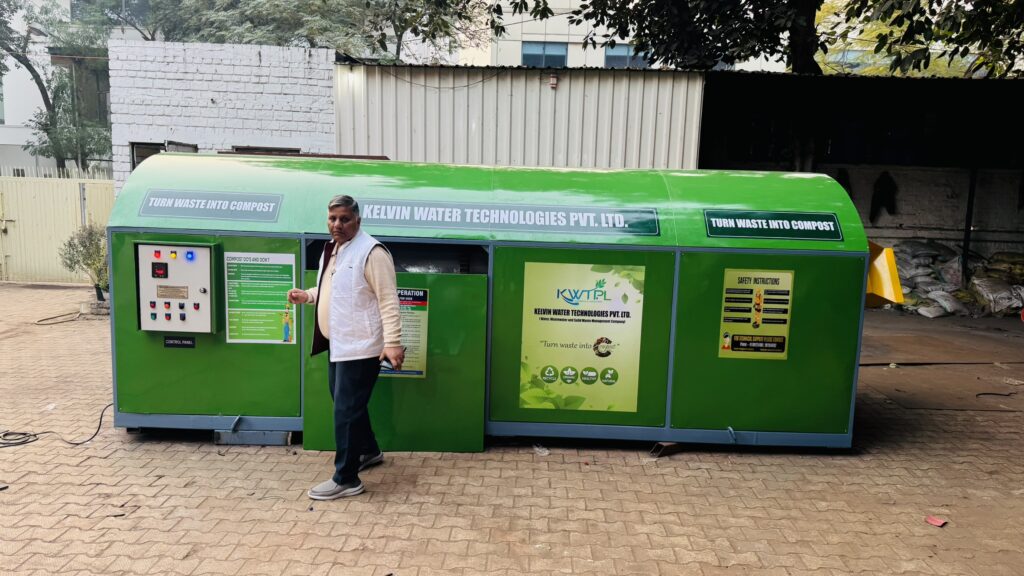How In-Vessel Composter Reduce Landfill Waste?

The issue of waste management has become one of the most pressing environmental challenges of our time. With rapid urbanization, population growth, and increased consumption, landfills are reaching their maximum capacities. Organic waste, including food scraps, garden waste, and other biodegradable materials, makes up a significant portion of the waste stream that ends up in landfills. This creates serious environmental problems such as greenhouse gas emissions, leachate contamination, and land use concerns. One of the most effective and eco-friendly solutions to tackle this challenge is the In-Vessel Composter (IVC).
In-vessel composters are advanced systems designed to treat organic waste in an enclosed, controlled environment, accelerating the decomposition process while minimizing environmental impacts. By diverting organic waste away from landfills, these composting machines contribute significantly to sustainable waste management practices.
What is an In-Vessel Composter?
An in-vessel composter is a fully enclosed unit that creates the ideal conditions for microorganisms to break down organic waste into compost. Unlike open windrow composting or pit methods, in-vessel composting provides a controlled environment where parameters such as temperature, aeration, and moisture can be precisely regulated.
These systems are usually equipped with automated mixing, aeration, and heating features, ensuring faster decomposition and odour control. The compost produced is stable, nutrient-rich, and can be used as a soil conditioner in agriculture, landscaping, and horticulture.
Why Landfills Are a Problem?
Landfills have long been the primary method of waste disposal, but they come with serious drawbacks:
1. Methane Emissions – Organic waste decomposing anaerobically in landfills produces methane, a potent greenhouse gas with over 25 times the global warming potential of carbon dioxide.
2. Groundwater Contamination – Leachate, the liquid formed from waste breakdown, can seep into soil and pollute groundwater supplies.
3. Space Scarcity – Rapidly growing cities are running out of space to establish new landfills.
4. Health Hazards – Landfills can harbour pests, release unpleasant odours, and negatively impact surrounding communities.
How In-Vessel Composter Reduce Landfill Waste?
1. Diverting Organic Waste from Landfills
Food scraps, garden trimmings, and organic industrial waste account for nearly 40–50% of the municipal solid waste stream in many regions. By treating this waste directly at the source with in-vessel composters, municipalities, businesses, and institutions can prevent tons of biodegradable material from entering landfills.
2. Accelerating Decomposition
Traditional composting methods can take several months to produce usable compost. In-vessel composting, however, accelerates this process, often producing high-quality compost within just a few weeks. This quick turnaround makes it feasible for organizations to adopt composting as a regular waste management practice.
3. Reducing Greenhouse Gas Emissions
Since organic waste is composted aerobically (with oxygen) inside the unit, methane emissions drastically reduced compared to landfill disposal. This makes in-vessel composting an important climate-friendly technology.
4. Minimizing Odor and Pest Problems
Open compost piles can attract flies, rodents, and other pests, along with generating foul smells. In-vessel composters, being enclosed, contain odours and prevent pest infestations, making them suitable for urban and institutional applications.
5. Producing Usable Compost
Instead of organic waste becoming a problem in landfills, it transformed into nutrient-rich compost that enhances soil fertility, improves water retention, and reduces the need for chemical fertilizers. This creates a circular economy where waste reused productively.
6. Supporting Regulatory Compliance
Many governments are now introducing stricter regulations on organic waste disposal. In-vessel composting helps institutions, businesses, and municipalities comply with these regulations by offering an efficient, on-site waste treatment solution.
Applications of In-Vessel Composter
- Municipalities – For large-scale organic waste diversion programs.
- Hospitals, Hotels, and Restaurants – To manage food waste sustainably.
- Educational Institutions – Schools and universities can reduce cafeteria waste while teaching sustainability.
- Industries – Food processing units, breweries, and agricultural industries benefit from on-site waste treatment.
- Residential Complexes – Apartment buildings and gated communities can handle organic waste internally, reducing dependency on municipal collection.
Kelvin Water Technologies and In-Vessel Composter
When it comes to sustainable waste management solutions in India, Kelvin Water Technologies Pvt. Ltd. stands out as a trusted name. With years of expertise in environmental engineering, Kelvin specializes in designing, manufacturing, and supplying advanced waste management systems, including in-vessel composters.
Why Choose Kelvin Water Technologies?
1. Customized Solutions – Kelvin provides in-vessel composters in different sizes and capacities to suit residential, commercial, and industrial needs.
2. Advanced Technology – Their composters come with automated mixing, aeration, and heating systems, ensuring faster composting with minimal human intervention.
3. Eco-Friendly Designs – The systems built to reduce greenhouse gas emissions and promote sustainable waste management.
4. Durability and Reliability – High-quality materials and robust construction ensure long service life.
5. End-to-End Services – From installation to training and after-sales support, Kelvin ensures that clients get maximum value from their investment.
Conclusion
The growing waste crisis requires innovative solutions that go beyond traditional disposal methods. In-vessel composters present an effective way to reduce landfill waste, curb greenhouse gas emissions, and create nutrient-rich compost from everyday organic waste.
By integrating such systems into our waste management practices, we can move closer to a circular economy where waste becomes a resource rather than a problem. Companies like Kelvin Water Technologies Pvt. Ltd. are leading the way in this transition by offering reliable, advanced, and customized in-vessel composting solutions.